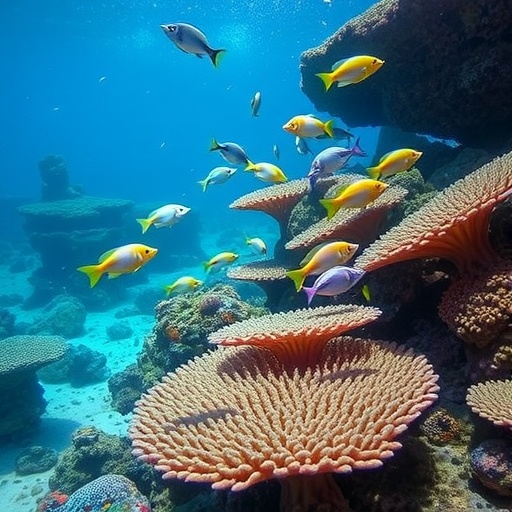In a groundbreaking study, researchers have unveiled the intricate dynamics of fish populations on oceanic coral reefs, particularly in light of varying disturbance histories. This research, led by Birt et al., investigates how changes in coral composition—caused by disturbances such as bleaching events or climate-induced changes—impact the taxonomic, trophic, and functional structures of fish communities. As coral reefs face unprecedented challenges due to climate change, understanding these relationships is critical for conservation efforts and ecosystem management.
The study meticulously examined coral reef sites that experienced different levels of disturbance over time. By comparing reefs that have been resilient to disturbances with those that have suffered substantial degradation, the researchers were able to draw correlations between coral health and fish diversity. The findings suggest that reefs with a stable coral structure harbor higher levels of species diversity and complex interactions among fish species. Conversely, those reefs undermined by severe disturbances often fell victim to simplified fish assemblages, dominated by fewer species.
One major insight from the research indicates that the loss of coral-rich habitats leads not only to a decline in fish numbers but also to a significant change in the types of fish present. Fish that are specialized feeders, dependent on specific coral species, may vanish altogether, replaced by more generalist species adept at exploiting the reduced habitat complexity. This shift carries profound implications for ecosystem functionality, as the ecological roles of specialized fishes are critical for maintaining the balance of coral reef communities.
Moreover, when assessing trophic dynamics, the study revealed a concerning trend: the energy flow within disturbed reefs was significantly altered. In healthy coral ecosystems, a diverse range of species ensures a complex food web, with different fishes occupying specific niches that allow for efficient energy transfer. However, in the context of disturbances, this intricate network is disrupted, leading to inefficient energy dynamics that may not support the broader marine ecosystem’s health.
Birt et al. employed a multi-faceted approach to their research, utilizing both field surveys and controlled experiments to validate their hypotheses. The methodical collection of data across various reef sites provided a holistic overview of the ongoing changes and potential future trajectories for these vital ecosystems. One of the critical takeaways from their examination is the potential for resilience; some coral reef systems showed remarkable recovery capabilities when given adequate protection and time.
The implications of this research are particularly salient to conservationists and marine biologists as the global response to climate change continues to evolve. The message is clear: preserving the integrity of coral reefs is paramount for supporting diverse marine life. Efforts to mitigate disturbances, enforce marine protected areas, and restore coral habitats must be prioritized to ensure these ecosystems survive and thrive.
As aquaculture and marine resource exploitation intensify, the research reinforces the invaluable role that healthy coral reefs play in supporting not only biological diversity but also local human economies reliant on fishing and tourism. By emphasizing the interconnectedness of coral health and fish populations, the study serves as a clarion call for stakeholders at all levels—from policymakers to local communities—to act decisively in the face of ecological change.
In conclusion, the research conducted by Birt et al. offers critical insights into the ongoing shifts occurring within marine ecosystems due to disturbances. As we navigate the uncertain future of our oceans, the findings highlight both the challenges posed by climate change and the potential for recovery through concerted conservation efforts. The survival of coral reefs—and the myriad of life they support—hangs in a delicate balance, contingent upon our ability to understand, protect, and restore these essential marine habitats.
As the world watches these monumental changes unfold, the research captures a vital moment in the broader narrative of marine ecology. Our understanding must evolve alongside these ecosystems, equipping us with the knowledge necessary to forge a sustainable path forward, ensuring future generations can experience the vibrant life of coral reefs and the complex tapestry of fish that depend on them.
The urgency of this research is underscored by the realities of climate change, pushing the scientific community to explore innovative solutions and adaptive management strategies. By fostering collaborations among scientists, policymakers, and local communities, we can work towards safeguarding coral reef ecosystems, ensuring that they continue to flourish in an ever-changing world.
The future of coral reefs—and the life they support—relies not only on understanding the past and present conditions affecting them but also on our commitment to actively engage in their preservation and restoration. Through informed action and a collective effort, we can strive to protect these precious ecosystems from the mounting threats they face, ultimately securing a healthier planet for all living beings.
Subject of Research: Taxonomic, trophic and functional change of fishes on oceanic coral reefs.
Article Title: Taxonomic, trophic and functional change of fishes on oceanic coral reefs with contrasting coral disturbance histories.
Article References:
Birt, M.J., Wilson, S., Sahin, D. et al. Taxonomic, trophic and functional change of fishes on oceanic coral reefs with contrasting coral disturbance histories.
Coral Reefs (2025). https://doi.org/10.1007/s00338-025-02761-3
Image Credits: AI Generated
DOI: https://doi.org/10.1007/s00338-025-02761-3
Keywords: Coral reefs, fish populations, ecological dynamics, climate change, biodiversity, conservation, trophic structures, functional ecology.




